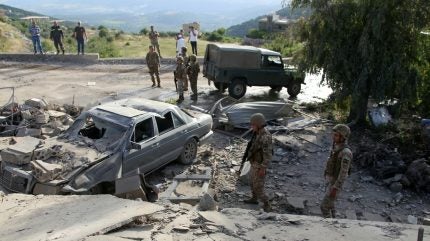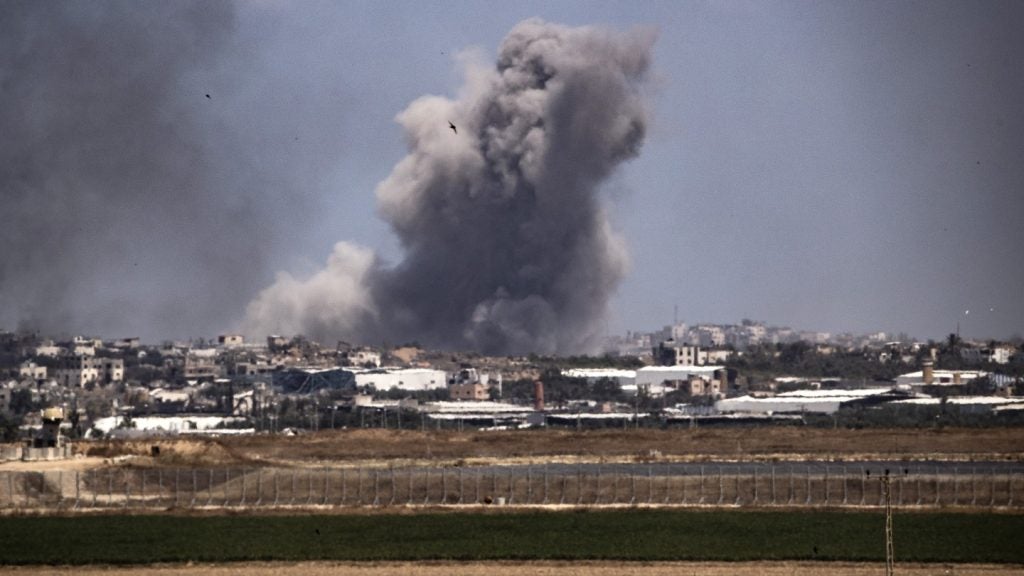
Concerns of the Israel-Gaza conflict spilling across the Lebanese border into full-scale regional war have never been higher.
Amid a constant barrage of Hezbollah projectiles and Israel Defence Forces’ (IDF) strikes across the border in northern Israel, the leader of Hezbollah, Sayyed Hassan Nasrallah warned of a war “without rules or ceilings” and threatened to target Cyprus if it aided Israel’s military offensive.

Discover B2B Marketing That Performs
Combine business intelligence and editorial excellence to reach engaged professionals across 36 leading media platforms.
Cyprus and Israel have a bilateral defence agreement which involves joint military exercises.
“Opening Cypriot airports and bases to the Israeli enemy to target Lebanon would mean that the Cypriot government is part of the war, and the resistance will deal with it as part of the war,” the Hezbollah chief said yesterday (19 June) at the memorial for Taleb Sami Abdallah, the most senior Hezbollah commander killed by the IDF since cross-border exchanges began on 8 October.
President Nikos Christodoulides said Cyprus is “not involved in any way” with Israeli forces, and reemphasised the country’s role in the humanitarian corridor to Gaza, which uses Larnaca Port as a launchpad for supplies.
Hezbollah, one of the most heavily armed non-state groups in the world, responded to Abdallah’s death last week by launching its biggest salvo of rockets into Israel yet.

US Tariffs are shifting - will you react or anticipate?
Don’t let policy changes catch you off guard. Stay proactive with real-time data and expert analysis.
By GlobalDataReferring to both Hamas' 7 October attacks and Hezbollah's offensives, Harley Lippman, a foreign policy expert who recently advised Israeli Prime Minister Benjamin Netanyahu and the Speaker of the Israeli Parliament in Jerusalem, believes “Israel is not prepared for war – they didn't expect these attacks.”
“Israel are on their heels,” Lippman tells Army Technology. “Now, they're adjusting and learning every day. They're strategising on what to do about Hezbollah and Iran.”
A peace agreement between Israel and Hezbollah looks increasingly unlikely.
On Monday (17 June), Netanyahu dissolved his war cabinet following the departure of centrist political veteran Benny Gantz – who spoke vehemently against escalated conflict with Hezbollah or Iran.
Gantz’ departure also leaves no end in sight to Israel’s offensive in Gaza, which has so far killed more than 37,000 Palestinians and 1,300 Israelis.
Lippman is firmly against a ceasefire, and believes Netanyahu and the other high-ranking Israeli officials think the same: “[If you] have a ceasefire, release the hostages and let Hamas survive, as most people want, I think that would be an incredible disaster. I am making a prediction it will lead to a bigger war, more Palestinian civilians being killed, and more Israelis.”
What is in Hezbollah’s weapons arsenal?
Hezbollah, which controls Lebanon’s Shiite-majority areas, including parts of the capital Beirut, southern Lebanon and the eastern Bekaa Valley region, is backed by Iran. Alongside Hamas and Yemen’s Houthis, Hezbollah forms part of Iran’s ‘Axis of Resistance’ against Israeli and US influence in the Middle East.
Supplied largely by Tehran via Syria or Iraq, Hezbollah’s weapons capabilities are considerable.
The group boasts upwards of 150,000 missiles and rockets, according to the World Factbook of the US Central Intelligence Agency. Ranges vary, but its projectiles are more than capable of reaching all parts of neighbouring Israel.
Hezbollah’s arsenal is lined with precision missiles, drones, anti-ship, anti-aircraft and anti-tank missiles, notably including the Russian-made Kornet.

The group, which also possesses armoured combat vehicles, light and heavy machine guns, mortars, landmines and artillery aplenty, is a secondary benefactor in the illicit arms trade between US-sanctioned nations including uneasy bedfellows Iran and Russia.
What is Hezbollah’s military strategy?
Despite a vast weapons arsenal, Hezbollah uses a cover and concealment strategy against larger, more organised militaries like the IDF.
Tunnels on the Lebanese-Israeli border are a primary conduit of Hezbollah warfare, which Israel targeted with ‘Operation North Shield’ in 2019.
Some tunnels remain intact and are still used by the militia’s approximately 30,000 active fighters and 20,000 reserves, predominantly made up of light infantry, trained on stealth and mobility.
Hezbollah employs what the US calls ‘mission command’ – a strategy of empowering subordinates to make independent battlefield decisions based on a commander’s intent. This force design allows Hezbollah troops to “operate effectively under conditions of overwhelming Israeli firepower”, according to the Centre for Strategic and International Studies (CSIS).
Campaigns fighting for Bashar al-Assad in Syria over the last decade has given Hezbollah access to T-72, T-54, T-55 and T-62 main battle tanks (MBTs).
The militia has also learnt manoeuvres typical of conventional armies, coordinating larger forces and employing suppressive artillery, although Hezbollah’s capacity to deploy MBTs in Lebanon itself is limited by Israeli targeting with fighter aircraft, artillery and drones.
All eyes now turn to the intensity of Hezbollah’s aerial assaults into Israel – and any potential escalation into Cyprus.





